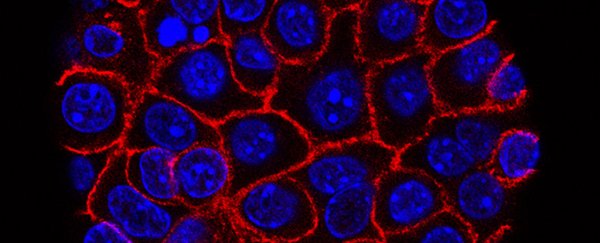Scientists have just increased the survival rate of pancreatic cancer for the first time over a decade. At the world's biggest cancer drug conference over the weekend, it was announced that a new combination of chemotherapy drugs has pushed the five-year survival rate from 16 percent to 29 percent of patients.
The team behind the trial says this treatment should become the new standard for pancreatic cancer patients around the world.
"This important trial shows that this drug combination could give pancreatic patients valuable extra months and even years and so will become the new treatment for patients with this disease," lead researcher John Neoptolemos from the University of Liverpool in the UK told James Gallagher at BBC News.
"The difference in short-term survival may seem modest, but improvement in long-term survival is substantial for this cancer," he added. "This drug combination will become the new standard of care for patients with the disease."
Pancreatic cancer is notoriously deadly, because symptoms often don't appear until it's too late. Once the telltale signs start to appear, such as weight loss, abdominal pain, and jaundice, the cancer has likely spread to other parts of the body.
"At that point, the tumours are significant in size and may encapsulate major veins and arteries," Natalie Wolchover explains for Live Science. "Furthermore, because the pancreas is located at a junction of several organs, cancerous tissue often spreads to the liver, gallbladder, or intestines early on."
If the tumour is caught while still localised, it can be surgically removed, but in the majority of cases - around 85 percent - the cancer returns even after this procedure.
At that point, chemo is one of the only real options to continue fighting the disease, and researchers have been working for decades to make this a more viable option.
Neoptolemos has been leading a series of international trials over the past 20 years called ESPAC (European study group for pancreatic cancer), and their first published results, back in 2004, showed that the drug gemcitabine could bring five-year survival up to 15-17 percent. Right there, they doubled the rate of survival with surgery alone.
Now, the team has reported the results of a new trial of 732 patients from hospitals in the UK, Sweden, France, and Germany, saying they've almost doubled this five-year survival rate to 29 percent.
With the overall average survival rate of pancreatic cancer across all treatment types being devastatingly low, this is pretty huge news.
"These are incredibly exciting results from a major trial for those diagnosed with this dreadful disease," Alex Ford, chief executive of Pancreatic Cancer UK, told the BBC. "The outlook for pancreatic cancer has been grim. With few treatment options, survival rates have barely changed in 40 years in the UK."
The new treatment also uses the chemo drug gemcitabine, but in conjunction with another drug, capecitabine.
The results of the trial, which were made public at the American Society of Clinical Oncology's annual conference in Chicago, showed that average survival times increased from 25 to 28 months, and the overall survival rate for five years after diagnosis was 29 percent of patients.
There was no difference in side-effects between the single and combination drug treatments, which is important - you don't want to spend whatever time you have left with your family and friends feeling sick and fatigued.
"The last thing you want if you may be going to die of cancer is fatigue," Neoptolemos told Sarah Boseley at The Guardian. "The rate of fatigue was quite low - for gemcitabine it is 5 percent and adding capecitabine it is 6 percent."
The team isn't entirely sure why the combination of drugs works so much better than the single drug, but it could be that the toxicity is decreased, which means patients can receive more of the treatment.
"It is a major win to find that adding a generic chemotherapy not only improves survival for these patients, but does so with little effect on patients' quality of life," Smitha Krishnamurthi from the American Society of Clinical Oncology told the BBC.
The results have yet to be published in a peer-reviewed journal, but we should see a paper in the coming months. The ESPAC trials are ongoing, and hopefully the next time we hear from Neoptolemos and his team, they'll have at least doubled that 29 percent.
